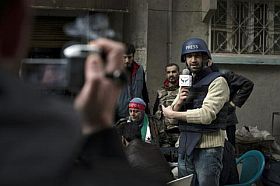


A Citizen with a Movie Camera

Sevara Pan writes about the DoxBox initiative called Global Day for Syria 2013:
In times when representations of the Orient lends itself to increasing misinterpretations, knowledge of languages and history does not suffice as much as the mechanical gathering of facts does not constitute an adequate method for grasping what is it all about. In such times comes art, which as the renowned poet and human rights activist Cesar Cruz put it, comforts the disturbed and disturb the comfortable.
The Global Day for Syria, which took place two weeks ago, is a project initiated by the Syrian documentary film festival Dox Box in support of Syrian filmmakers and in high regard to its people who struggle for their vision of what they are and want to be. In March of last year the management of the Syrian documentary film festival Dox Box decided to cancel the festival due to the upheavals in the country. Instead, they called for documentary film festivals around the world to participate in the project Global Day for Syria.
The second edition of Syria Global Day put in spotlight a few short documentaries by filmmakers from Syria, including Salma Aldairy, Roula Ladqani, and Lina Alabed, among others. Yet, most importantly, it brought forth films made by Syrian citizens themselves in a program called “A Citizen with a Movie Camera” (in 6 compilations: Dialogue, In the Searching for Truth, The Leak, Letters, Moments, and Stories). Beautiful, unsettling, and at last insightful and thoughtprovoking the films were selected from over 300,000 videos from and about Syria that had been uploaded on Youtube. From this enormous amount
of footage, the programmers of Dox Box chose the best films to shed light on the situation in Syria, a picture somewhat different from that given by the mainstream media.
By bringing forth films of its own people who are excluded from the society’s established structures of representation and hegemonic power, Global Day for Syria, I believe, ensued the question the Indian theorist Gayatri C. Spivak once posed — can the subaltern speak? In the age of numerous technological possibilities, fast internet connection and light mobile cameras, citizens of Syria seem to have found voice or at least an outlet for their fervor to speak. Global Day for Syria let its people speak louder, hence bestowing to remapping of the the sheer “history told from below.”
I reckon that more than anything, one of the programme’s thematic compilations “Dialogue” explores the dichotomy of the Self and the Other in “here and now” of Syria. “In the tiny space left for “dialogue”, a dialogue between partisans, between voices and bullets , […] between two hiding snipers, everything can happen, but as we fall into the illusion of cinema, some voice brings us back: it is the real.” At times turning futile, the compilation “Dialogue” continuously attempts to juxtapose the Self to the Other in the present-day Syria. Other is part of what defines and even constitutes the Self, as Edward Said, the proponent of the Orientalism theory would say. But as image of the Other is inescapably colored, distorted, and eventually reduced by the “lense” of the Self, the dialogue seems to be hampered.
As for the stylistic approach and dramaturgy of the film compilation, shaky amateur handheld camera work innate in the very essence of citizen journalism does not seem to bother. In fact, I appreciate this piece of filmmaking to remain unpolished. The intertitles of the descriptive narrative material edited between the disparate video clips in both English and Arabic help orientate yet do not aim at predefining the meanings of each. Devoid of clear cut dramaturgy, the austere poetry of each scene ripens, raptures, and eventually draws us into the audacious undertakings of the involved. Part of what makes the films so compelling to me is that for most of their running time you cannot predict where they are going to. The reality is not scripted — it is witnessed only.
In one of the scenes we observe the dialogue between two snipers, one standing at the vantage point of the balcony, whereas the other hides below. Amidst urban ruins, the two venture to converse on weather and barbeque, which, within my conception, comes at first as jaded cynicism taken out of place.Yet somehow it leaves us with a tad of sadness caused by a yearning of two young men for a peaceful life. Devoured by the heartfelt dialogue between two men, we hear the sound of every footstep they take at naked unease. What each of them is fighting for is Islam, Assad, or their homeland — the dialogue is riveting and provocative.
The film compilation “Dialogue” exposes the interdependence of human life that can neither be reduced to a formula nor brushed aside as irrelevant. “Perhaps through realizing human nature in a shape distant and foreign to us, we shall have some light shed on our own.” Sailing in the highest spheres of delirium, running amok, we have a right to wonder. Because oddly enough in this tale of war, it is as personal as it gets.
http://www.dox-box.org/index.php?lang=2
TSM, ed.: The films mentioned in the text of Sevare Pan are available on
http://www.arteeast.org/pages/events/2324/